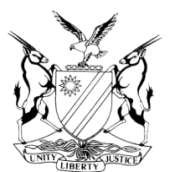REPUBLIC OF NAMIBIA

IN THE HIGH COURT OF NAMIBIA, NORTHERN LOCAL DIVISION, OSHAKATI
REVIEW JUDGMENT
Case Title: The State v Martin Jesus Gariseb | CR No.: 15/2020 Case No: TSU-CRM-1512/2018 | |
Division of Court: Northern Local Division | ||
Heard before: Honourable Mr Justice January J et Honourable Mrs Justice Salionga J | Delivered on: 12 February 2020 | |
Neutral citation: S v Gariseb (CR 15/2020) [2020] NAHCNLD 24 (12 February 2020) | ||
The order:
| ||
| Reasons | ||
JANUARY J (SALIONGA J concurring): [1] This court has on numerous occasions in the past directed that section 112 (1) (a) of the Criminal Procedure Act, Act 51 of 1977 (the CPA) is intended for trivial or minor offences. [2] Considering the high sentences even for a first conviction for possession of dependence- producing drugs, it is certainly not a trivial or minor offence. [3] Magistrates should not slavishly adhere to submissions of public prosecutors on what section of the CPA to follow when an accused pleads guilty. [4] It was decided in S v Rooi (CR 20/2019) [2019] NAHCMD 61 (20 March 2019) that: '[3] It should be noted that from previous review matters considered by this court, conflicting judgments were delivered as regards the classification of the substance methaqualone. In some instances, as the present, methaqualone was classified as a potentially dangerous dependence-producing drug listed under Part III of the Schedule of the Act, whereas in other cases, it had been classified either under Part I or Part II of the Schedule. The court until now has been guided by the classification as set out in Jutastat e-publications which provides, as far as methaqualone is concerned, that it is classified under Part II as a dangerous dependence-producing substance. ‘This court has subsequently come to realise that the Jutastat classification did not incorporate earlier amendments made to the Schedule as provided for in Proclamation No. 277 of 1977.1 The relevant part of the Proclamation reads that Part I and Part II of the Schedule to the Act is amended by: (a) the deletion of the item “Methaqualone” in Part II and the addition of the item “Methaqualone” to Part I.’ [5] There is, in my view a duplication of convictions when both cannabis and methaqualone falls in one part of the schedules and when an accused committed offences in connection therewith on the same date and place. | ||
H C JANUARY JUDGE | J T SALIONGA JUDGE | |
1 (Government Gazette No. 5789 dated 28 October 1977).